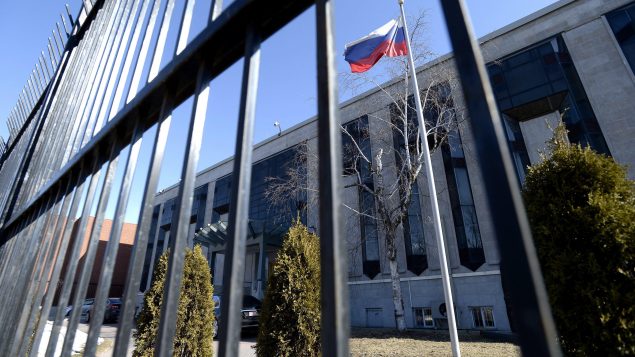The Entire Picture
"We all can remember the efforts by Russian propagandists to discredit our minister of foreign affairs in various ways through social media and by sharing scurrilous stories about her."
Prime Minister Justin Trudeau
"Trying to silence an official spokesman of the embassy doesn't mean you are right. Expelling someone for voicing an alternative opinion or giving a different analysis of a situation is very un-Canadian."
"I gave our point of view on this issue in terms of World War Two history. These people pledged allegiance to Hitler."
"What they were notorious for was killing innocent people."
Kirill Kalinin, press secretary, Russian embassy, Ottawa
/arc-anglerfish-tgam-prod-tgam.s3.amazonaws.com/public/EHELSCX7JBIJ7FT5O6PWFKRPUQ.jpg) |
The Russian Embassy in Ottawa. LARS HAGBERG/AFP/Getty Images
|
The issue on that side of the ledger is one of vengeance; Canadian Prime Minister Justin Trudeau doesn't take kindly to any criticism of his regime, his directives, his Cabinet members or himself for any reasons whatever. Do so at one's own peril. The 32-year-old career diplomat at the Russian embassy is on a learning curve. But he was in effect, only doing his job, even if that meant attacking the personal politics and family background of Canada's Foreign Affairs Minister Chrystia Freeland.
He did so by releasing publicly-accessed information about her grandfather, Ukrainian-born Michael Chomiak, a Nazi collaborator during the Second World War, a rabid anti-Semite and a fascist himself. And Mr. Kalinin had alerted Canadian news outlets to a story they never imagined existed, providing them with material present in the public domain but overlooked. Some among the Ukrainian Canadian community objected to Michael Chomiak's Nazi past. And anyone with an inkling of history might wonder how it was that he and his family were allowed entry to Canada in 1948.
A Polish history magazine last year along with some pro-Russian media sites revealed the history behind Chomiak as a Nazi collaborator. In response, the Foreign Affairs Minister protested that she was being victimized by a Russian campaign of disinformation, her office claiming that her Ukrainian nationalist grandfather had never collaborated with Nazi Germany. In fact, he had worked with the Nazis in editing an anti-Semitic newspaper in Poland. Chrystia Freeland's protestations of her grandfather's innocence were refuted by a distant cousin living in Canada, a history professor.
There was no escape from the truth. There were photographs showing Chomiak partying with senior Nazi leaders, while files from the newspaper were replete with pro-Nazi propaganda and stereotypical cartoons denigrating Jews. The very office and printing presses operated by Chomiak had been seized from a Jewish proprietor, sent with his family to a concentration camp, and there exterminated. Chomiak fled to Germany in advance of Russian troops, where he continued to edit the newspaper.
That very newspaper that promoted the Nazi-approved formation of the 14th Waffen SS Division, comprised of Ukrainian volunteers, a little tidbit revealed by the Los Angeles Holocaust Museum. Kalinin tweeted photographs of monuments to Ukrainians who had served in that SS unit that had been erected in Canada. Canadian officials were not amused. Kalinin retorted that information relating to the monuments was available online.
Those same Canadian officials were "under pressure" from senior levels of government to counter the inappropriate' Russian efforts to "spread disinformation". So they leaned heavily on Russia's efforts to undermine democracy, despite one thing having little to do with the other. "Framing them as 'destabilizing western democracies' seems a step too far", observed one public servant in an email. All of this relating to Canada's decision to expel three diplomats working out of the Montreal consulate, and Mr. Kalinin, as pay-back for embarrassing Chrystia Freeland and by extension the Liberal government.
None of which overlooks Russia's outlier performance in the last number of years -- from invading Georgia and Ukraine in support of pro-Russian rebels in both countries and the Kremlin's occupation of Abkhazia and South Ossetia in the former and the seizure of the Crimean Peninsula and Port of Savastopol in the latter. Nor Vladimir Putin's support of mass-murdering Syrian dictator Bashar al-Assad, aiding him in his battles against the Syrian Sunni rebels, alongside Hezbollah and the Iranian Republican Guard Corps.
Russian defence of the Syrian regime's use of chemical weapons against helpless civilians, denying such attacks ever took place, when the UN's Organization for the Prohibition of Chemical Weapons Joint Investigative Mechanism findings that both chlorine gas and sarin were released on civilians in attacks from eastern Ghouta to Khan Sheikhoun, do nothing to promote a view of Russian respect for civilizational norms. Much less the Salisbury attack when a military nerve agent engineered in Russian military labs was used in an attempted assassination of a former Russian agent who spied for MI6.
Russia has much to answer for, but its diplomatic corps in this instance of selecting those who represent a threat to democracy, as undercover agents purposing to sow destabilization appear to have been targeted unwisely.
 |
| The flag flies outside the Embassy of the Russian Federation to Canada in Ottawa on Monday, March 26, 2018. Foreign Affairs Minister Chrystia Freeland says Canada is expelling four Russian diplomats and will deny permission for three others to bolster Russian staff in Canada. (Justin Tang/THE CANADIAN PRESS) |

<< Home